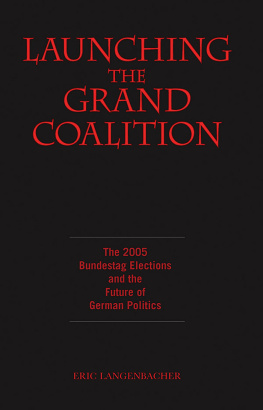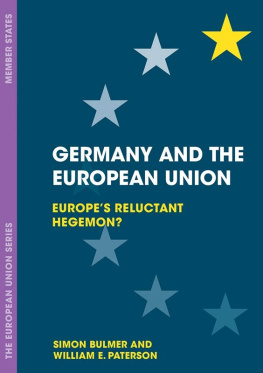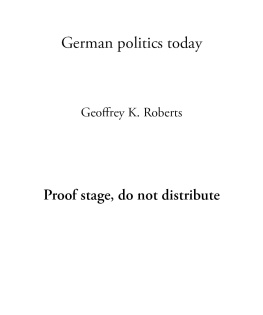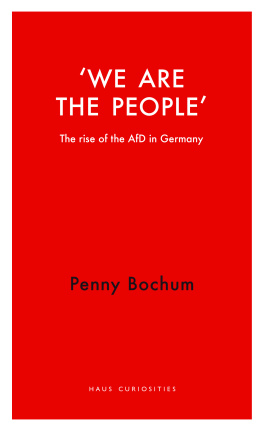Published in 2019 by
Berghahn Books
www.berghahnbooks.com
2019 Berghahn Books
Originally published as special issues of
German Politics and Society, volume 36, numbers 1 & 2.
All rights reserved. Except for the quotation of short passages for the purposes of criticism and review, no part of this book may be reproduced in any form or by any means, electronic or mechanical, including photocopying, recording, or any information storage and retrieval system now known or to be invented, without written permission of the publisher.
Library of Congress Cataloging-in-Publication Data
Library of Congress Control Numzxber: 2019942496
British Library Cataloguing in Publication Data
A catalogue record for this book is available from the British Library
ISBN 978-1-78920-264-9 hardback
ISBN 978-1-78920-265-6 paperback
ISBN 978-1-78920-266-3 ebook
INTRODUCTION
MERKELDMMERUNG
Eric Langenbacher
Liminal Germany
The last few years in Germany, like elsewhere in the West, have been a bit strange. On the surface, everything seems to be going rather well. The economy has been chugging along with the country having the largest trade surplus in the world for three years. Unemployment is at near-record lows and real wages have been increasing.1 State finances are solidbudgetary surpluses have been used to reduce the debt-to-GDP ratio. In light of this economic strength, even though it took nearly six months to form a new government after the September 2017 Bundestag elections, few seemed to notice. Various crises bubbled up periodically, but nothing has been too dramatic. Syria? Brexit? Trump? The Alternative for Germany (AfD)? The diesel scandal? Chancellor Angela Merkel would always be there to take care of things.
Much, however, had been brewing underneath the surface. Expectations were mounting for increased spending on domestic social programs, affordable housing, and infrastructure after years of relative austerity. Responses to the simmering external challenges that had been put on hold for much of 2017 and 2018 because of the election campaign and the caretaker government had to be formulated. Despite hopes from some quarters that the British will pull back from the 2016 decision, Brexit in some form will likely happen during the current parliamentary term. Given the possibility of a transitional phase or delay, it is uncertain how much of a negative impact this will have on the German or European economybut negative it will be at one point.2 Illiberal eastern European governments in places like Hungary and Poland need to be more vigorously confronted, and the new populist government in Italy with its budget-busting spending plans needs to be handled. Presidents Vladimir Putin of Russia, Recep Tayyip Erdoan of Turkey, and, ever-the-wild-card Donald Trump in the U.S. (despite much wishful thinking) are not going away any time soon. Indeed, Putins warmongering against Ukraine was ratcheted up in late 2018. Trade restrictions (including tariffs announced by Trump in March 2018 with more threatened) and a deleterious transatlantic trade war are possible.
Looming in the background was the most dramatic event of the last parliamentary termthe migration crisis, which peaked in 2015 when Merkel modified policy and opened Germanys borders to over a million asylum seekers, refugees, and other migrants. Despite some incidents such as the attacks on women in Cologne at New Years 2016, many observers have concluded that the countrys efforts to integrate these newcomers have thus far been reasonably successful.3 Nevertheless, migration and integration remain huge issues, not the least because they have spurred a backlash, specifically the empowered right-radical Alternative for Germany party and a wave of right-wing, xenophobic demonstrations such as in Chemnitz at the end of August 2018 and some violence.4
More structurally, many have observed that Germanys power has been rising for years. Notable instances include imposing policy preferences on other EU member states during the Eurozone crisis and the migration crisis in 2015. Millions of people are waiting to see if Germany is going to take on a bigger leadership role abroadif it can or will help to fill the vacuum of shrinking American leadership. Nevertheless, the country has continued to deny its newfound influence and has shrunk from more conventional power projection as with the 2011 decision not to support allied efforts to oust Gaddafi in Libya. Despite some increases, it cannot even bring itself to commit 2 percent of GDP to defense spending despite a budget surplus. It is the ever-reluctant hegemon. Yet, as much as Germans might not want to take up the mantle of leadership, the alternativea power or leadership vacuum could be much worse with proliferating bad actors filling the void and doing substantial damage to the regional and global interests of Germany and the liberal democratic community more broadly. Until now, the country has been able to delay a reckoning or a clear acknowledgement of the reality of its increased power, as well as the obligations that come with accepting such a role. It is a kind of luxury to take your time, deciding not to decide. Germanys liminal moment is, however, coming to an end.
This long-anticipated reckoning is now at hand as the Merkel era winds down. Merkel herself probably sensed her weakened position ever since her partys lackluster result in the 2017 electionif not already earlier with the fallout from her policies during the height of the migration crisis. At the age of sixty-four, she is currently the third-longest serving postwar chancellor with over thirteen years in power and was Christian Democratic Union (CDU) party leader for the better part of two decades, until she announced that she would not stand again for this office at the December 2018 CDU Party Congress.5 She might last as chancellor until the next scheduled elections in 2021, but this is unlikely once the new party boss consolidates her position over the course of 2019. Merkels party and the country are preparing for who will come next and what kind of leadership the country needs or wants.
















